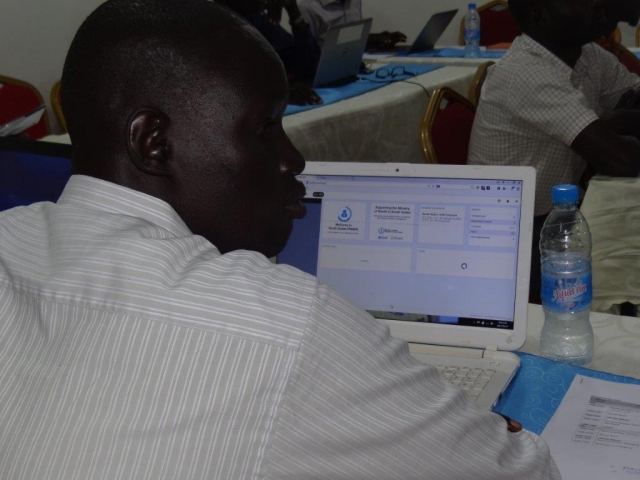WHO strengthens surveillance, alert and response using an innovative electronic system in South Sudan

Juba, 8 June 2017 - In collaboration with the Ministry of Health, the World Health Organization (WHO) has rolled out an electronic surveillance system called Early Warning, Alert and Response System (EWARS) to enhance the collection, management and analysis of Integrated Disease Surveillance and Response (IDSR) data.
The overall objective of the web based system is to overcome the reporting challenges of the transmission of paper-based standardized data tools and strengthen surveillance and response capacities and ultimately reduce morbidity and mortality from epidemic prone diseases as well as other public health events.
The system is designed for real-time information sharing using mobile phones and triggers automated alerts when disease thresholds are exceeded and are received by email, on the phone and within the application. It allows prompt response and documents the results of risk assessments and outbreak investigations. The system also permits Epidemiological Bulletins and other information products to be published automatically.
“EWARS is a project led by the WHO Health Emergencies Programme (WHE). It can be deployed immediately after the onset of an outbreak and rapidly configured with minimal expertise,” said Dr Joseph Wamala, Epidemiologist, WHO Country Office South Sudan. “It is designed for frontline users, and built to operate in difficult and remote environments.”
Integrated Disease Surveillance and Response (IDSR) strengthening Since 2006, South Sudan has implemented the Integrated Disease Surveillance and Response (IDSR) strategy with WHO’s technical support and United States Agency for International Development (USAID) financial commitment. The IDSR strategy provides a framework for strengthening the national disease surveillance system in compliance with the International Health Regulations (IHR) 2005 core capacity requirements. In 2015, the EWARS supported by the European Civil Protection and Humanitarian Aid Operations (ECHO), was introduced to complement and enhance IDSR effectiveness in the conflict-affected States.
“Strengthening surveillance is one of the key objectives of WHO’s strategic and operational response plan in South Sudan,” said Dr Abdulmumini Usman, the WHO Representative to South Sudan. “Since 2013, the implementation of the EWARS project in conflict affected areas supported the three key functions of IDSR: Surveillance, Alert and Outbreak Response,” Dr Usman added.
A total of 108 alerts were investigated in 2017, out of which 18 outbreaks were confirmed and effectively responded to. Theses outbreaks include cholera, measles and chickenpox.
To improve IDSR performance and roll-out the system to other States in the country especially famine and cholera affected areas, WHO in collaboration with the Ministry of Health trained 80 County (district) surveillance officers. Each was provided with a mobile phone with the EWARS application installed, allowing them to submit IDSR reports immediately to State and National level and verify any alerts that are triggered. Surveillance officers from 10 hubs were also trained on the laptop version of the application, so they can closely monitor performance in each county and support risk assessment and outbreak investigations where needed.
EWARS also supports active reporting during disease outbreaks, and is being used to report case-based cholera data in all counties affected by the ongoing outbreak. With immediate effect, this allows counties to report cholera cases using mobile phones and then view and analyse the results in real-time at County, State and National level.
A single IDSR bulletin is now published by the system each week – integrating data from surveillance, alert and response, and presenting the results in automated tables, graphs and maps. This is crucial to permit Ministry of Health and WHO to effectively lead the response to the cholera outbreak and other health emergencies.
The second phase of the roll-out of the project is planned for August-September, where support will be decentralized further down to health facility level. It will also see the integration of the public health laboratory network as well as integration with other sources of data including nutritional surveillance, acute flaccid paralysis (AFP) and measles case-based surveillance; and community based integrated disease surveillance.
_________________________________________________
For more information please contact:
More information on the EWARS : info [at] ewars.ws (info[at]ewars[dot]ws)
Dr Wamala Joseph Francis, +211955036445, wamalaj [at] who.int (wamalaj[at]who[dot]int)
Dr Christopher Haskew, +41 22 791 32 36, haskewc [at] who.int (haskewc[at]who[dot]int)
Ms Jemila M. Ebrahim, +211950450007, ebrahimj [at] who.int (ebrahimj[at]who[dot]int)



